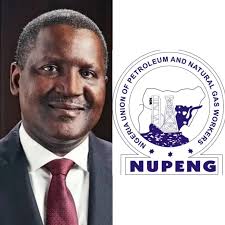Welcome To Glint News.........

Enugu Grounded as IPMAN, NUPENG Strike Paralyzes City — Dangote Dispute Sparks Transport Chaos, Residents Slam Mbah Over Failed CNG Buses
Enugu, the bustling Coal City, came to an unprecedented standstill on Monday as major streets emptied out and residents were left stranded following the commencement of a three-day warning strike jointly declared by the Independent Petroleum Marketers Association of Nigeria (IPMAN) and the National Union of Petroleum and Natural Gas Workers (NUPENG).
The strike, which began at dawn, immediately forced fuel stations across the state to shut down, crippling transportation and triggering chaos. Normally vibrant areas such as Ogbete Main Market, Coal Camp, New Haven, and Abakpa turned into ghostly stretches, with only a handful of private vehicles navigating the deserted roads. The few commercial tricycles and buses that dared to operate hiked their fares by as much as three times the normal price, leaving many unable to afford transport. Workers, traders, and students were seen trekking long distances under the scorching sun, while others simply gave up and returned home.
For many Enugu residents, however, the most painful dimension of Tuesday’s paralysis was not just the strike but the total absence of the highly publicized Compressed Natural Gas (CNG) buses promised by Governor Peter Mbah. The buses had been marketed as a revolutionary transport solution, designed to shield the people of Enugu from the impact of fuel scarcity and future disruptions. Yet, when residents needed them most, not a single CNG bus was deployed.
This failure has sparked outrage, especially considering the scale of sacrifice and resources sunk into the project. Earlier this year, thousands of traders in Enugu had their shops, stalls, and properties demolished to make way for the construction of the CNG park. Entire commercial hubs were flattened, and eyewitnesses reported that more than 20 lives were lost during the demolition exercises, as clashes erupted between security forces and resisting traders. Families of the deceased are still mourning, and victims of the demolition received no compensation for their losses, despite repeated appeals to the state government.
Beyond the human tragedy, the financial toll was enormous. Billions of naira worth of properties were destroyed in the process, wiping out livelihoods and pushing many families into poverty. Traders who once supported their households through businesses in Ogbete and Coal Camp now wander the streets in search of new means of survival.
Adding salt to the wound, billions more were reportedly spent by the Enugu State Government in procuring the CNG buses, yet the investment failed to deliver on the very day the people needed relief the most. For residents, the irony is bitter: lives and livelihoods were sacrificed, public funds were poured in, and promises were made — but at the height of Monday’s crisis, the buses were nowhere to be seen.
A civil servant, Mr. Chijioke Nwobodo, could barely conceal his anger:
"Governor Mbah promised us that these CNG buses would ensure Enugu people never suffer during fuel scarcity again. But today, thousands of us were stranded, and not a single bus appeared. People lost their shops, their properties, even their lives, just for this project, yet what has it given us? Nothing."
The strike itself is rooted in deeper problems plaguing Nigeria’s oil and gas sector. According to union sources, the crisis was triggered by a disagreement involving the Dangote Group, which has recently begun refining operations in Nigeria. Dangote has reportedly refused to join NUPENG, a move that unions say threatens to give the company monopoly powers over the oil business. With strong backing from the Federal Government and the Nigerian National Petroleum Company Limited (NNPCL), Dangote enjoys supply advantages that other marketers lack, leaving IPMAN and NUPENG members to struggle with distribution bottlenecks and operational difficulties.
The unions argue that the preferential treatment granted to Dangote could suffocate competition and destabilize the entire fuel distribution network. Their strike is intended as a warning to the government, but they caution that if their grievances remain unresolved, a full-blown nationwide strike may follow — one with even greater consequences for Nigerians already battling high fuel prices and economic hardship.
As the strike entered its first day, the paralysis extended beyond transport into every sector of life in Enugu. Schools recorded low attendance, offices ran skeletal operations, and markets were nearly empty as customers could not find transportation. Traders with perishable goods lamented looming losses as logistics networks collapsed.
By evening, the mood across the Coal City was one of anger, despair, and growing distrust. Citizens feel abandoned — caught in the crossfire between powerful corporations, unions, and a state government whose much-vaunted CNG project has collapsed under its very first test.
With two more days of the strike remaining, anxiety grips residents who fear harsher consequences if the crisis persists. Many are asking whether Governor Peter Mbah will finally come forward with answers, or whether Enugu will continue to suffer in silence.
For now, the Coal City remains under a chilling pause — its streets deserted, its markets silenced, and its people betrayed by promises that have turned to dust.